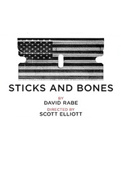Holly Hunter on Her Theater Roots & Leading David Rabe's Cathartic Vietnam War Drama Sticks and Bones
Holly Hunter’s film and television career is packed with memorable roles, but she’s also a stage veteran—in fact, the Coen Brothers wrote her part in Raising Arizona after seeing her in Crimes of the Heart on Broadway in 1981. The Oscar and Emmy winner is returning to her roots in the New Group production of Sticks and Bones, David Rabe’s 1971 drama about rigorously placid suburban parents (Hunter and Bill Pullman) who go from elated to distraught when their son (Ben Schnetzer) returns from the Vietnam War. Below, Hunter talks about her return to the stage and why seeing David Rabe’s work is like “breathing rare air.”
What’s it like being back onstage after a nearly decade-long absence?
Plays are funny things. I started acting when I was 14 doing high school plays. Then, at 15, I left to do repertory theatre in upstate New York at a place called Cortland Rep and then I apprenticed there and went back when I was 16. Then I went to Carnegie Mellon and studied theater for four years, so that kind of immersion at a young age it’s kind of like riding a bicycle: it becomes part of you. It’s not like anything else. Being away from the stage and coming back to it is like water.
So, there was no relearning process or readjustment?
It’s all a learning process, and that’s one of things that I find so exciting about doing a play as good as this one. The learning never ends. When I’m backstage listening to the play, when I’m doing a scene that we spent hours rehearsing and now performing, I hear things that I’ve never heard. I see things that I’ve never seen. There are discoveries made on stage by the company that I’m in. I’m constantly learning. But this is all predicated on David Rabe, because there are some plays that do have a ceiling: you can only take them so far. With this play, it is so complex and there’s such density to the denial that each character experiences, and on top of if the familial complexities, make it something actually worth revisiting performance after performance.
Harriet’s cheeriness is almost a mania. It must be an exhausting performance. How do you recover every night?
One of the things that any actor takes comfort in is that people have been here before you. I’m setting no precedent. People have performed Hamlet eight shows a week. They have performed King Lear eight shows a week. They have performed Blanche DuBois eight shows a week [laughs]. I saw F. Murray Abraham do Galileo at Classic Stage Company. There are far more monstrous-sized characters that people bring to life. It’s what you want. You want a catharsis in the theater, and David Rabe has given us one. That’s what makes this play feel like it’s breathing rare air is the tone of it. The landscape is not naturalism and at the same time it must be truthful. There must be a real honesty in the love that the family experiences. Otherwise, it’s not worth it.
Your father, uncle, and two brothers were in the military during wartime. Are you drawing on any real-life experience?
I’m a child of the ‘70s, not a child so much of the ‘60s. I’m just a little behind this era. My brothers were very much in this era and my sister. I gleaned a certain kind of consciousness about this, but only vicariously. I was too young to really experience this full on. At the same time, because of my age—I’m 56—I’m very aware of this era. I certainly benefitted from the incredible music.
As an adult, do you now look at the period of time differently?
The Vietnam War takes on a whole other meaning for me now, especially in light of the Iraq and Afghanistan wars. I feel that we have been steeped in a kind of denial about Iraq. Going into that war, it was a silent kind of conflict that was felt by fewer Americans than one would think. Vietnam was felt by so many because there was a draft, so the tentacles came down via the lottery into anybody’s lives. Iraq felt like it was more relegated to parts of the country where young men and women were enlisting, and it just felt like we never saw bodies. Iraq went by almost without a whimper, and there’s been a lack of funding for veterans coming home needing attention. There are no funds to really address many of the issues that people experience—from psychological to physiological—that they come back to the United States with.
What makes you decide to take a role, whether it’s Sticks and Bones or something else?
In the case of this play, this play was a conundrum in a way because it reads really differently than how it’s performed. It was such an enticing thing that I kind of went, “Wow, I just want to throw in the money and I want to gamble on this one.” It felt [like] there was a richness there and the tone of it is so mysterious and has such a strange lift off the ground that I just wanted to see what that would be like.
See Holly Hunter in Sticks and Bones at the Pershing Square Signature Center.
